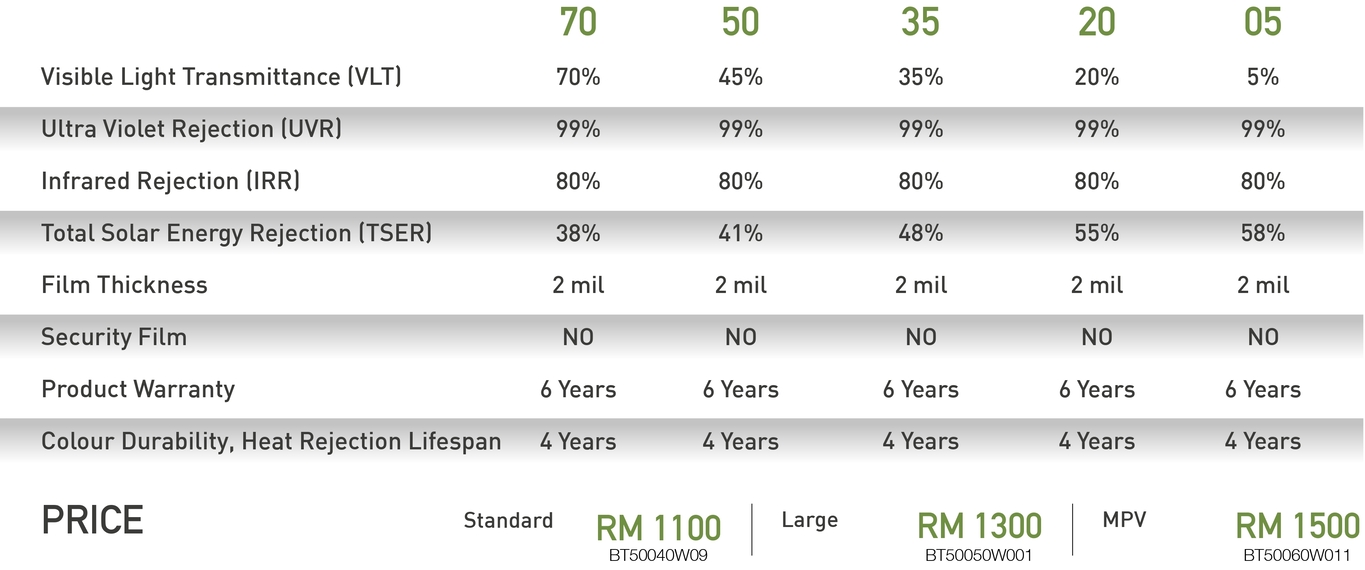


































VLT is Visible Light Transmission. VLT is the amount of visible light that passes directly through filmed glass. The darker the tint, the lower the visible light transmitted.
Total Solar Energy Rejected (TSER) is the percentage of the total solar energy that is rejected. TSER includes visible light, infrared radiation and ultraviolet energy. The higher the percentage, the higher the percentage of solar energy deflected. Most tinting shops use Infrared Rejection (IRR) as a guide to the level of heat rejection. However, IRR only covers a fraction of TSER. Internationally, TSER is used as a guide as it is a more accurate way of measuring heat rejection.
Ultraviolet Rejection is the percentage of ultraviolet energy deflected away from the window film. Ultraviolet rays can cause upholstery and furnishings to fade. It can also cause skin damage and skin cancer.
The total amount of infrared rays rejected by the window film. The higher the number, the higher the infrared rays rejected. IR Rejection is the amount of solar radiation NOT transmitted through a glazing system at a particular wavelength or range or wavelengths.
The performance of Security/Safety films rely solely on the thickness of the film. Thicker films will endure a higher breaking point, i.e. absorbing higher impact forces in terms of LB/inch² (pound per square inch), making harder it to penetrate the window. Thickness of Security/Safety films are measured in terms of “Mil†• (1 Mil = 25 Microns = 0.025 Millimeter).
RhinePro has a history of over 16 years of R&D and technology. When you choose RhinePro, you are not just choosing a window film, you are choosing a premium product with superior performance plus the service provided and the factory back ed warranty, which lasts for 3-10 years.
According to the JPJ, the regulations require a minimum of 70% Visible Light Transmission (VLT) for the front windscreen and a minimum of 50% for the sides and rear windscreen. However, the new regulation that will be implemented from May 1, 2015 states that the rear windscreen and rear passenger windows’ to have 30% VLT.
In short, yes. All RhinePro Automotive films are carefully selected to comply with current JPJ regulations
After installation, it is advisable to keep your windows closed for a minimum of 48 hours. There might be watermarks present, which will disappear in a couple of days. If you should decide to remove the tint, there will be no permanent stains on the glass. Any leftover adhesive can be easily removed with cleaning agents.
Warranty for all tints covers bubbles, peeling, oxidisation, discoloration and cracking. Depending on the tint, the warranty period can range from 3-10 years.
RhinePro is a USA registered brand. RhinePro using the USA highest technology for manufacturing its products.
RhinePro have several range of products, the warranty period can range from 3-10 years.
RhinePro have E-warranty system for our customers therefore, all our customers can claim warranty national wide through RhinePro E-warranty portal.
For vehicle, the duration of installation is depending on the vehicle size, Normally standard procedure for producing high quality of installation work for a saloon size car take approximately 2 hours or longer. Bigger size vehicle like MPV or SUV type with more pieces of mirror require longer time to complete whole car tinting.
For building, on requiry RhinePro Tinting Specialist will send a tint advisor to the site to consult, measure, quote, and give estimation of working duration.
RhinePro Window Films are made to last for many years. The exact length of time depends upon the type of film applied, window orientation, type of glass it is applied to and the particular climate in which it is applied. Most applications last well beyond the warranty length.
RhinePro Sun Control Films are designed to reduce the amount of solar heat transmission through window glass by increasing the solar reflection (not necessarily visible reflection) and solar absorption through the glass. Typical colored or dyed films work primarily through increased absorption. The color absorbs the solar energy at the glass, thus reducing the direct transmission into the room. These films are not as effective as reflective films for reducing heat. Reflective films are films that have been precision coated with metals. These metallized films are designed to increase the solar energy reflection of the glass. RhinePro reflective films range from moderate to excellent in solar performance (heat gain reduction). All RhinePro Sun Control Films are made to be transparent and optically clear. The ultraviolet protection is built into the adhesive system to provide longevity to the film as well as provide UV protection for your home and office furnishings. Most RhinePro Window Films are protected with our abrasion resistant coating that provides long -term durability and maintained appearance.
RhinePro window films using USA highest technology to manufacturing its products like Multi-layer Sputtering, Tinite, and Advanced Nano-Ceramic technology.
Most often, our commercial customers will purchase RhinePro Window Films for tenant comfort and justify the purchase through energy cost savings.